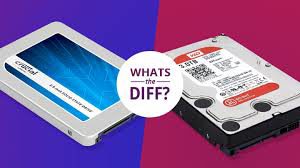Today computer users have several different types of hard drives to choose from. This article will explain the differences and reasons a user might choose one over the other.
- Mechanical hard drive: This hard drive is still the most common hard drive in use today. Although there are several ways to setup a hard drive, most users use the basic, simple configuration. If you were to look inside of a mechanical hard drive you would something that resembles an old turn table record player. There is a disk that spins ans a needle that reads information off the disk. This needle is a laser type and does not actually touch the disk. This article was designed to explain the different types of hard drives and not how they all work. Basically the information is written to the drive and accessed when needed. There are two basic speeds, 5400 RPM and 7200 RPM. The 7200 RPM disk spins faster and therefore accesses information faster.
- Solid state hard drive: This drive is much like a flash drive in that it has no moving parts. These drives have a controller that allows the hard drive to retain information like a flash drive but also act as an operating system. Instead of storing information on a disk like a mechanical drive, information is stored on blocks created by an algorithm written to control information placement. Because the drive is not required to spin to find the information as with a mechanical drive, the average speed of a solid state hard drive is three to ten times as fast as most mechanical drives. The solid state drives have basically three types of controllers, SLC, TLC and MLC. Some of the controllers are a little faster and some have a longer life. In real life use the speed between solid state drives is difficult to notice. Currently Crucial and Samsung have the most sales and best reputations. The average warranty is three years.
- Hybrid Solid state hard drives (SSHD) These hard drives are a compromise between solid state and mechanical hard drives. Most of these drives assign 8 gigabytes of solid state technology and the rest of the drive is a mechanical drive. The hybrid drive learns as you use it, and remembers the the places that are used most commonly by the user. It provides a fast boot up and program launch using the 8 gigabytes while storing other information on the mechanical side. You might ask “why not just buy the solid state drive for the speed?” It’s all about money! If you don’t need a lot of memory than I would choose the solid state hard drive. If you need say 500 gigabytes for large storage, that SSD could set you back $150 dollars. The speed of the hybrid is about twice as fast as a standard mechanical drive.
For more information about the right drive for you please feel free to contact me at larry@computerdoctorboise.com or call 208-968-5780

